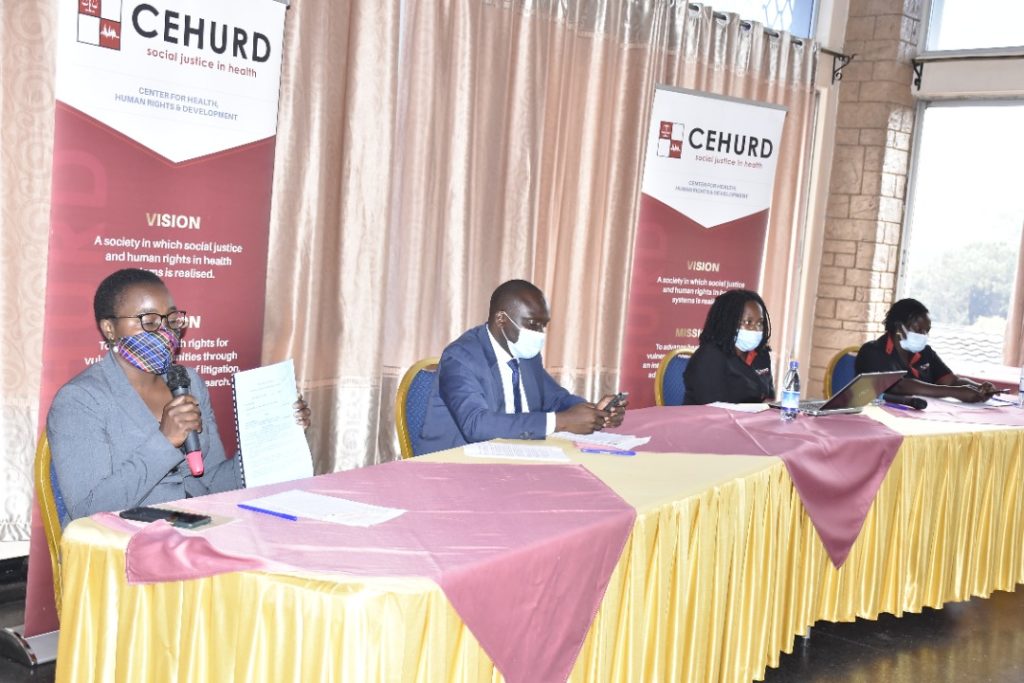PRESS STATEMENT
FOR IMMEDIATE RELEASE
Friday, June 25th, 2021

Regulate the rates hospitals are charging for management and treatment of COVID-19
KAMPALA. Center for Health, Human Rights and Development (CEHURD) and Mr. Mulumba, Moses, a concerned public spirited litigant ,have filed a case against the Government of Uganda, the Minister of Health and the Medical and Dental Practitioners Council for failure to regulate the exorbitant fees for the management and treatment of COVID-19 patients in health facilities.
In this case filed in the High Court, we call upon the Honourable Court to weigh in and compel the respondents (the Minister of Health and the Medical and Dental Practitioners Council and Attorney General)to intervene and regulate chargeable rates for management and treatment of COVID-19 patients, to save the lives of Ugandans who are undoubtedly continuing to lose lives at the quest for profits by the private actors.
Over the past months, there have been several reports of families and individuals struggling to cover the costs related to treatment and management of COVID-19. The rates charged by the hospitals are clearly exorbitant in nature and largely unbearable to vulnerable Ugandans seeking the COVID 19 treatment in hospitals amidst the pandemic and tough economic times.
We are mindful that the government is the primary provider for health as a social good. In cases when the government cannot make this provision, then it bares the obligation to regulate the private providers. Since Uganda recorded its first case of COVID-19, the government through the Minister of Health has issued several Statutory Instruments to regulate the national response to the pandemic. We are however surprised that no instrument has been issued to regulate theprivate sector as it supports the national response to COVID-19. This to us, is a huge omission which the government through the Minister of Health must urgently address.
‘It is just unconceivable that the government would fail to ensure a functional public health system and also negate its primary duty of regulating costs charged by the private sector providing health services amidst a pandemic. The government cannot regulate everything else on COVID-19 except treatment costs. We except the Minister of Health to use her powers in the law to protect Ugandans from the unreasonable costs charged by the private sector in the COVID-19 treatment and management. It is just unacceptable that some actors can have this crisis as a profiteering moment’ Mulumba, Moses one of the applicants in the case, and also CEHURD’s Executive Director.
A recent survey of media reports reveals that a day in the Intensive Care Unit (ICU) at a private hospital in Kampala will cost a COVID-19 patient between Shs2 million to Shs10 million per day depending on the facility. A patient with moderate symptoms is likely to pay between Shs1.5 million and Shs5 million daily, depending on where they go. Considering that treatment can go on for weeks, the final bill comes down to an amount too exorbitant to bear.
As the effects of COVID-19 continue to ravage the country, more people are going to require treatment and management of the virus .Since there is no regulatory framework to rein in private hospitals these high changes will continue
The applicants in the case therefore ask Court to compel ;The Attorney General, the Medical and Dental Practitioners Council, and Minister of Health Hon. Dr Jane Ruth Aceng Ocero intervene and regulate medical fees chargeable by hospitals in the treatment and management of persons suffering from COVID-19, as is their statutory obligation.
For more information, contact Nakibuuka Noor Musisi 0782 496681 or email nakibuuka@cehurd.org and copy info@cehurd.org



